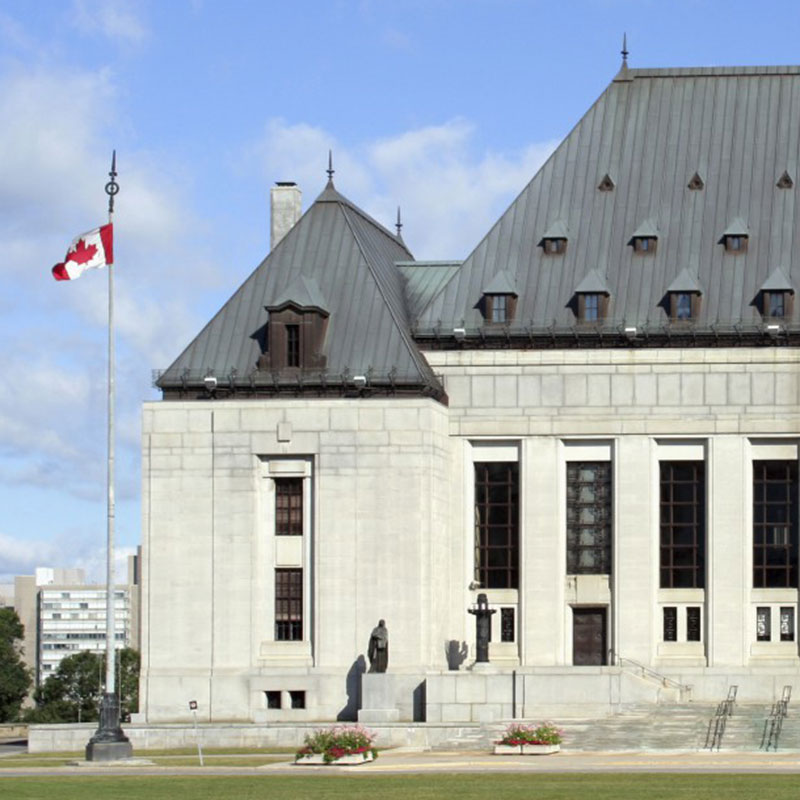Today, the Supreme Court of Canada has released its long awaited decision in Frank v Canada, striking provisions of the former Canada Elections Act that had prohibited certain non-resident Canadians citizens from voting in federal elections.
The decision is a victory for the principle of equal citizenship. We had argued, before the Supreme Court, that the voting restrictions effectively created a discriminatory system of tiered citizenship, which treated non-residents as less Canadian, second-class citizens. Today’s decision confirms that this system of tiered citizenship is contrary to the Charter’s broad protections for the right to vote.
Prior to the Court’s ruling, Canada’s federal government had amended the Canada Elections Act and removed the contested provisions, which denied the right to vote for “non-resident” electors, i.e., Canadian citizens who have been residing abroad for more than five consecutive years or for Canadian citizens who are abroad for less than five years but who do not intend to return to Canada. Yet, today’s decision has important implications both for the future of the right to vote in Canada and for the meaning of Canadian citizenship more broadly.
A majority of the Supreme Court reasoned that the restriction on voting was not adequately tailored to respond to a specific problem. Indeed, the legislation was over-inclusive, restricting the rights of voters who were strongly committed to Canada and who were deeply affected by Canadian legislation and policies. The majority also noted that any good that was achieved by ensuring electoral fairness for resident Canadians was clearly outweighed by the effects of disenfranchising non-resident Canadians. This is particularly true in a globalized society, where many Canadians now choose to live abroad for significant amounts of time. The decision will now stand as an important limit on any future government attempting to deny non-resident electors the right to vote.
Our arguments before the Supreme Court focused on why the residency-based prohibitions on voting were contrary to the value of equality that underlies the Charter right to vote. Prior to being amended, the Canadian Elections Act treated an entire class of Canadian citizens, numbered in the hundreds of thousands of Canadian citizens, differently and unfairly based on a personal characteristic — their place of residence.
The government argued, in support of these restrictions on the right to vote, that the vote should be restricted to Canadians who are most affected by, and obliged to obey, Canadian laws. But as the majority recognized today, these arguments miss the mark. Canadians residing abroad pay tax on income made in Canada, frequently have family in Canada, and can be, and often are, subject to Canadian laws that operate outside our borders (such as, for instance, our laws governing campaign finance and electoral advertising). In short, they have a real stake in Canadian laws and policies and should not be left without political representation.
More troublingly, residency-based prohibitions on voting deprive an entire class of Canadians of the opportunity to carry out their fundamental duties of democratic citizenship and thereby deprive them of their personal autonomy and self-determination. They create a category of “second class” citizens who are not trusted to give full voice to their political concerns. The discriminatory character of this tiered-citizenship is deepened by the correlations that often exist between residency and ethnic or national origin. Residency-based restrictions ensure that classes of citizens from certain ethnic or national backgrounds will have a lesser say in Canadian politics because these groups are more likely to live abroad for significant amounts of time.
Today’s decision is an important win for the right to vote in Canada. A difference in place of residence simply cannot justify depriving individuals of their right to be full and equal Canadian citizens.
About the Canadian Civil Liberties Association
The CCLA is an independent, non-profit organization with supporters from across the country. Founded in 1964, the CCLA is a national human rights organization committed to defending the rights, dignity, safety, and freedoms of all people in Canada.
For the Media
For further comments, please contact us at media@ccla.org.





